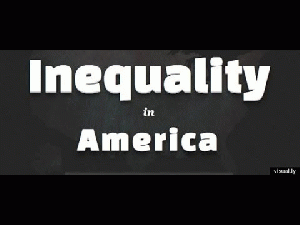You might think many initial recipients of the imaginary $1,000 would offer $1 or even less, which their partner would gladly accept. After all, even one dollar is better than ending up with nothing at all.
But that's not what happens. Most of the $1,000 recipients are far more generous, offering their partners at least $250. And most of partners decline any offer under $250, even though "no deal" means neither of them will get to keep anything.
This game, or variations of it, have been played by social scientists thousands of times with different groups and pairings, with surprisingly similar results.
A far bigger version of the game is now being played on the national stage. But it's for real -- as a relative handful of Americans receive ever bigger slices of the total national income while most average Americans, working harder than ever, receive smaller ones. And just as in the simulations, the losers are starting to say "no deal."
According to polls, they've said no deal to the pending Trans Pacific Trade Agreement, for example, and Congress is on the way to killing it.
It's true that history and policy point to overall benefits from expanded trade because all of us gain access to cheaper goods and services. But in recent years the biggest gains from trade have gone to investors and executives while the burdens have fallen disproportionately on those in the middle and below who have lost good-paying jobs.
By the same token, most Americans are saying "no deal" to further tax cuts for the wealthy and corporations. In fact, some are now voting to raise taxes on the rich in order to pay for such things as better schools, as evidenced by the election of Bill de Blasio as mayor of New York.
Conservatives say higher taxes on the rich will slow economic growth. But even if this argument contains a grain of truth, it's a non-starter as long as 95 percent of the gains from growth continue to go to the top 1 percent -- as they have since the start of the recovery in 2009.
Why would people turn down a deal that made them better off simply because it made someone else far, far better off?
Some might call this attitude envy or spite. That's the conclusion of Arthur Brooks, president of the American Enterprise Institute, in a recent oped column for the New York Times. But he's dead wrong.
It's true that people sometimes feel worse off when others do better. There's an old Russian story about a suffering peasant whose neighbor is rich and well-connected. In time, the rich neighbor obtains a cow, something the peasant could never afford. The peasant prays to God for help. When God asks the peasant what he wants God to do, the peasant replies, "Kill the cow."
But Americans have never been prone to "kill the cow" type envy. When our neighbor gets the equivalent of new cow (or new car), we want one, too.
Yet we are sensitive to perceived unfairness. When I ask those of my students who refuse to accept even $200 in the distribution game why they did so, they rarely mention feelings of envy or spite. They talk instead about unfairness. "Why should she get so much?" they ask. "It's unfair."
Remember, I gave out the $1,000 arbitrarily. The initial recipients didn't have to work for it or be outstanding in any way.
When a game seems rigged, losers may be willing to sacrifice some gains in order to prevent winners from walking away with far more -- a result that might feel fundamentally unfair.
Robert Reich, former U.S. Secretary of Labor and Professor of Public Policy at the University of California at Berkeley, has a new film, "Inequality for All," to be released September 27. He blogs at www.robertreich.org.






